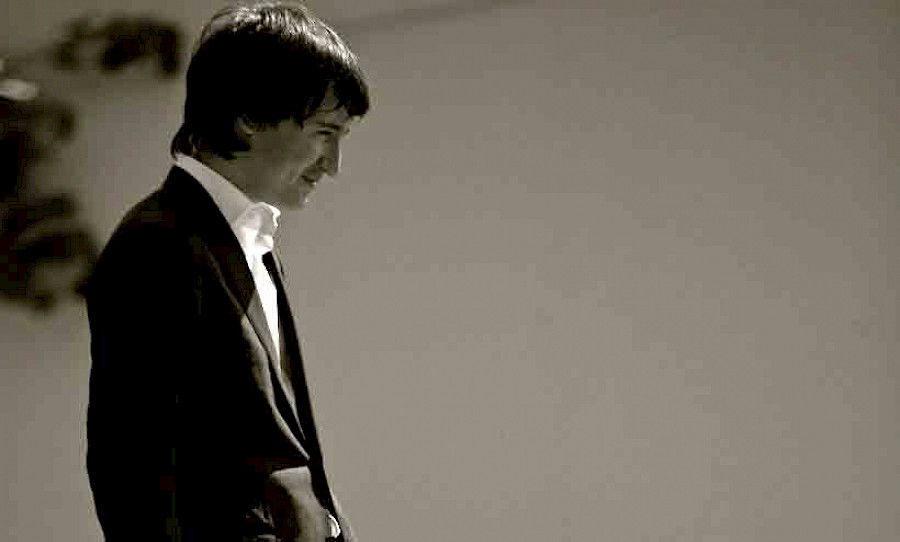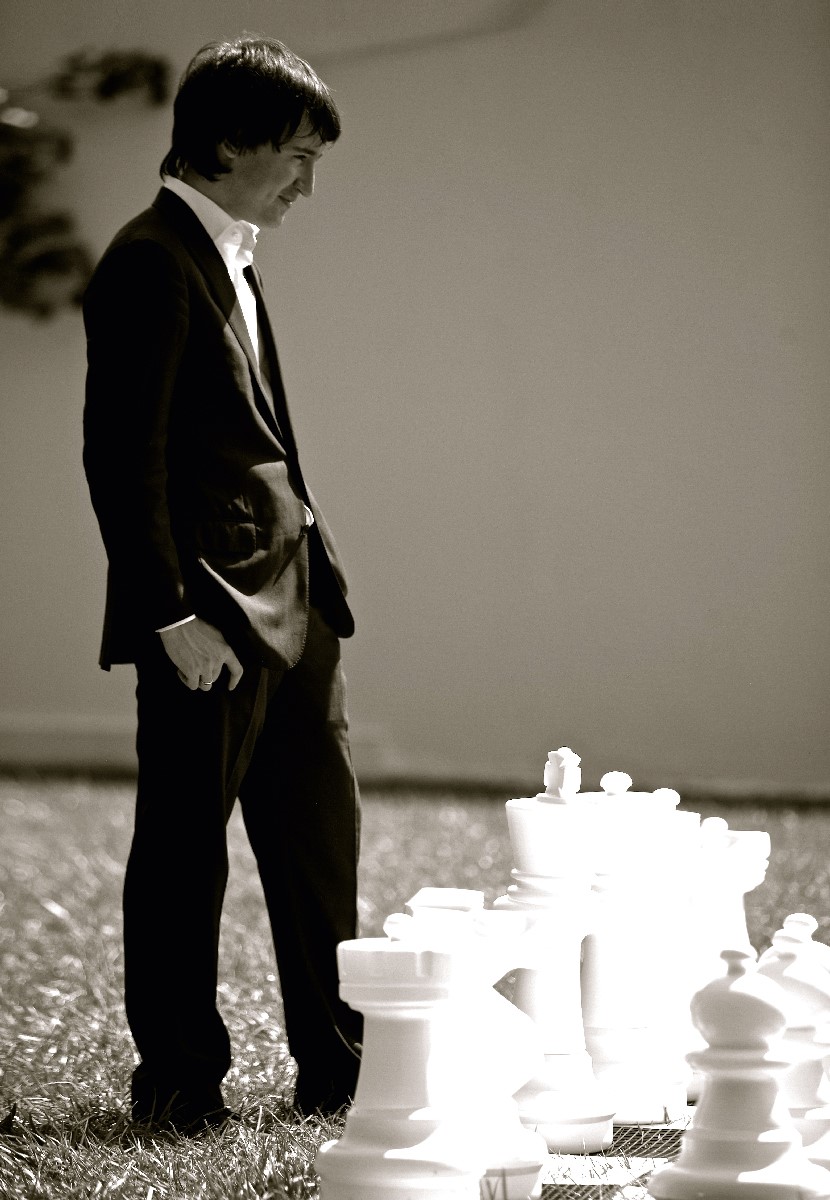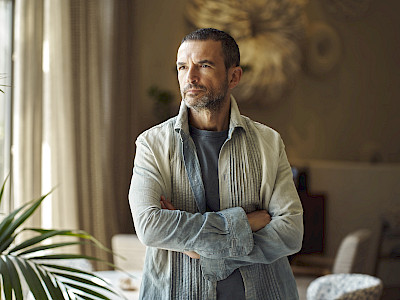
The heading “1440 minutes” is one day in the life of our hero. An attempt to plunge into his world, to feel the rhythm of his everyday life, immersed in its dimension and sense of time. In the case of Teymour Rajabov, the international grandmaster, the usual time frames recede before the primary chess chaos. Starting from a timeless starting point, we find ourselves in a monochrome chess kingdom, in which everything is subject to the rules of the game, dating back more than a thousand years...

Morning. Debut. The initial stage of the game.
At one time, the great Fisher spoke about chess as a creative activity requiring inspiration. He practiced for days on end, sometimes he didn’t touch chess for weeks. And I don’t have a clear schedule – I can stay up until the morning and then continue training.
Old Indian Defense.
When a serious competition is ahead, everything should be planned – whether it is preparation for a specific opponent or tournament. We have to make a guess and analyze the situation. Today, chess without physical training is difficult to imagine, since it is physical endurance that helps withstand tremendous psycho-emotional stress and maintain concentration during the game, which can last up to seven hours.
Noon. A demarcation line is a line conditionally drawn between the fourth and fifth horizontals and dividing a chessboard into two equal halves.
When you are in the vacuum of the creative process, training is a kind of brainstorming: studying an opponent, opening moves, strategy, etc. And only in a state of complete detachment do ideas arise that can give rise to a new fashion in chess, generate new variations... This all very excites the nervous system. This inspires. But for a long time to be in this state of gushing with ideas is impossible. At some point, fatigue comes, and usually it coincides with the time when I have to go for sports.
The queen's gambit is a systematic struggle for the center, and, unlike half-open or open debuts, events on the board do not develop so forcefully.
I don’t follow my time outside chess. A bit of idleness, meeting friends, visiting exhibitions with my wife. If there were more than 24 hours in a day, then I would have spent them in the family circle somewhere in the country. In fact, I’m a happy person – I would like to spend all my time with loved ones with whom I feel so good that I don’t want to fly away somewhere or do something incredible. In addition, I traveled so much that I probably only had to fly to the moon…
Day. Middlegame. The middle of the game.
Plunging deep into the game, you are so mentally and emotionally disconnected that you do not respond to questions or calls. Perhaps this is not easy for loved ones. But, I think, this condition is familiar to many who are seriously engaged in their profession. Time is compressed and flies at lightning speed…
Tacking – positional maneuvers during which general tension, uncertainty are maintained, and the parties do not reveal their intentions to the end.
Of course, working in this mode and from an early age is a lot of stress. But at the same time it is an incredible satisfaction that comes when there is only one way out of the maze of chess. The very process of playing and training, constructing a chess composition, and solving chess etudes is the most beautiful part of a chess game from which you get satisfaction. The loads are mostly psycho-emotional. Maintaining a high level of concentration can be difficult, but it is at the peak of this intensity that the best is born – new ideas, solutions, parties.
But there is another side to the struggle – defeat. When you are still young, you haven’t grown up and are left with a one-on-one defeat – this is the worst thing. In victory you are surrounded by people, congratulations, laurels. And in defeat, you are alone with your heartache. There is such a well-known expression on this score: “Victory has a thousand fathers, and defeat is always an orphan.”
Sicilian Defense
After I had to go through a lot, I developed immunity to defeat. The understanding came that this is not the end of life, and there are still a million different chances ahead. Of course, when it is taking so much effort, work endlessly when everything is at stake, and suddenly collapse of your hopes!.. This is very difficult to handle.
Evening. Endgame. End of the game.
My longest party lasted six hours. But the longest emotional duel in my chess career was a meeting with Kasparov at the age of 15, a well-known game for all world fans. There was a moment when Kasparov had a lost position, and he passed the time – minute, thirty seconds – time is insignificant in life standards, but I had a feeling that it would never end! But it still ended!
Check is a position in which the king is attacked by an enemy piece or pawn.
I am the only person born after Kasparov became the world champion, and who beat him. He did not lose white for more than seven years, by the time of our meeting he had won 10 tournaments in a row. No one doubted that this tournament would be the eleventh in a row. The world press was full of messages about my victory, various cartoons appeared as Kasparov lost to a fifteen-year-old boy at the tournament in Linares.
Mate is a situation where the king is under the check and there is no way to avoid this check.
In the history of chess, about fifteen people have become recognized world champions in the classical line. And for me, at the age of fifteen, the feeling that I beat one of those who, as it were, “invented” this game was indescribable. When the game ended, mom asked dad how it all ended. Dad replied: “Tim won.” She could not believe: “Won! Kasparov’s ?!” We all went in shock for a couple of days...
Night. Domination is an overwhelming advantage, which manifests itself in complete control over key fields and the space of the chessboard as a whole.
Favorite literary characters whom I sympathize with since childhood are Sherlock Holmes and Earl of Monte Cristo. The way The Prisoner of Château d'If avenged his enemies, I always liked. I have a very good memory for people who intrigue and weave intrigues. But I do not want to take revenge!
Text by Leyla Sultanzadeh
Photo by Emil Aghayev
The material was published in the second issue.



